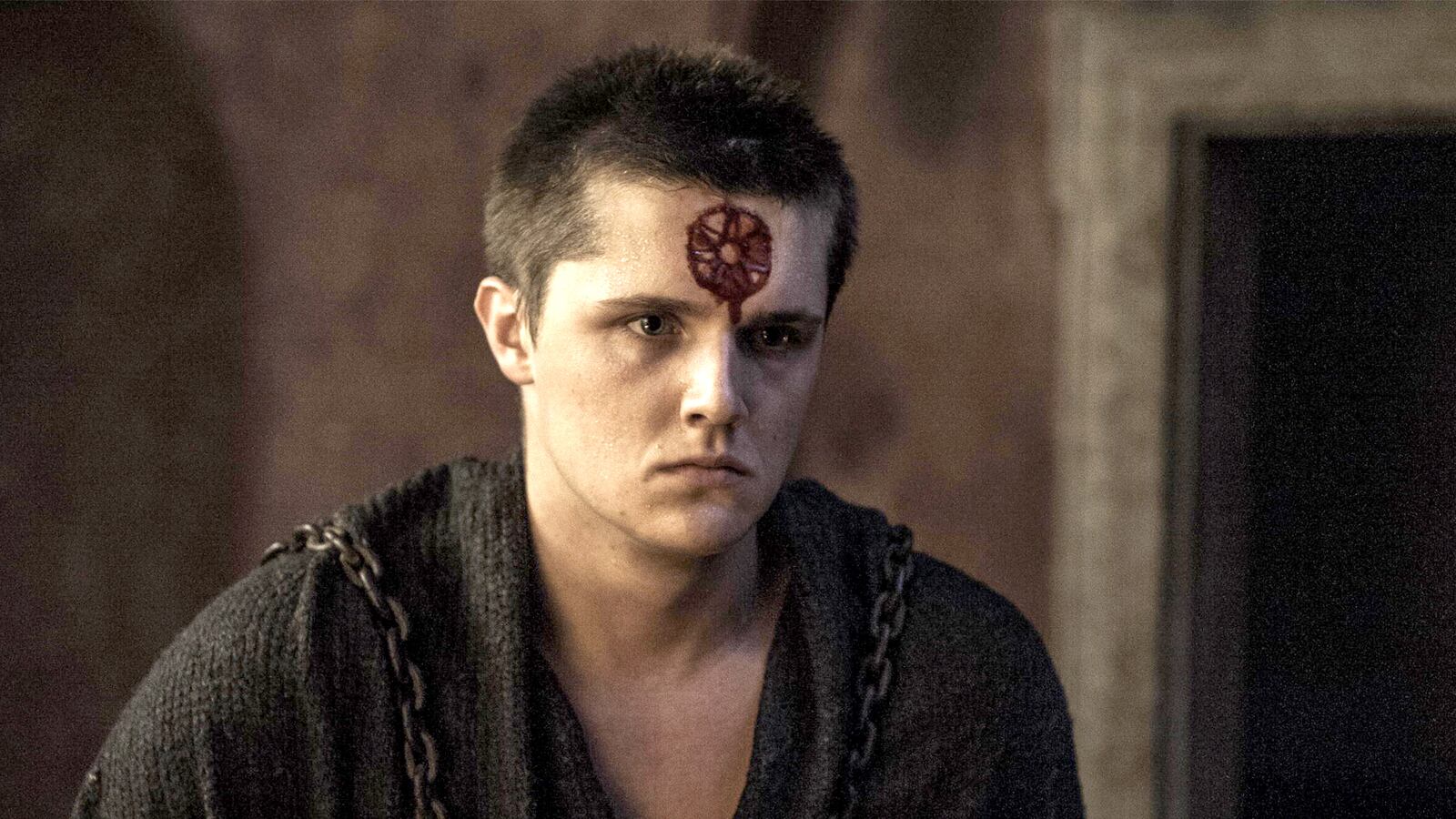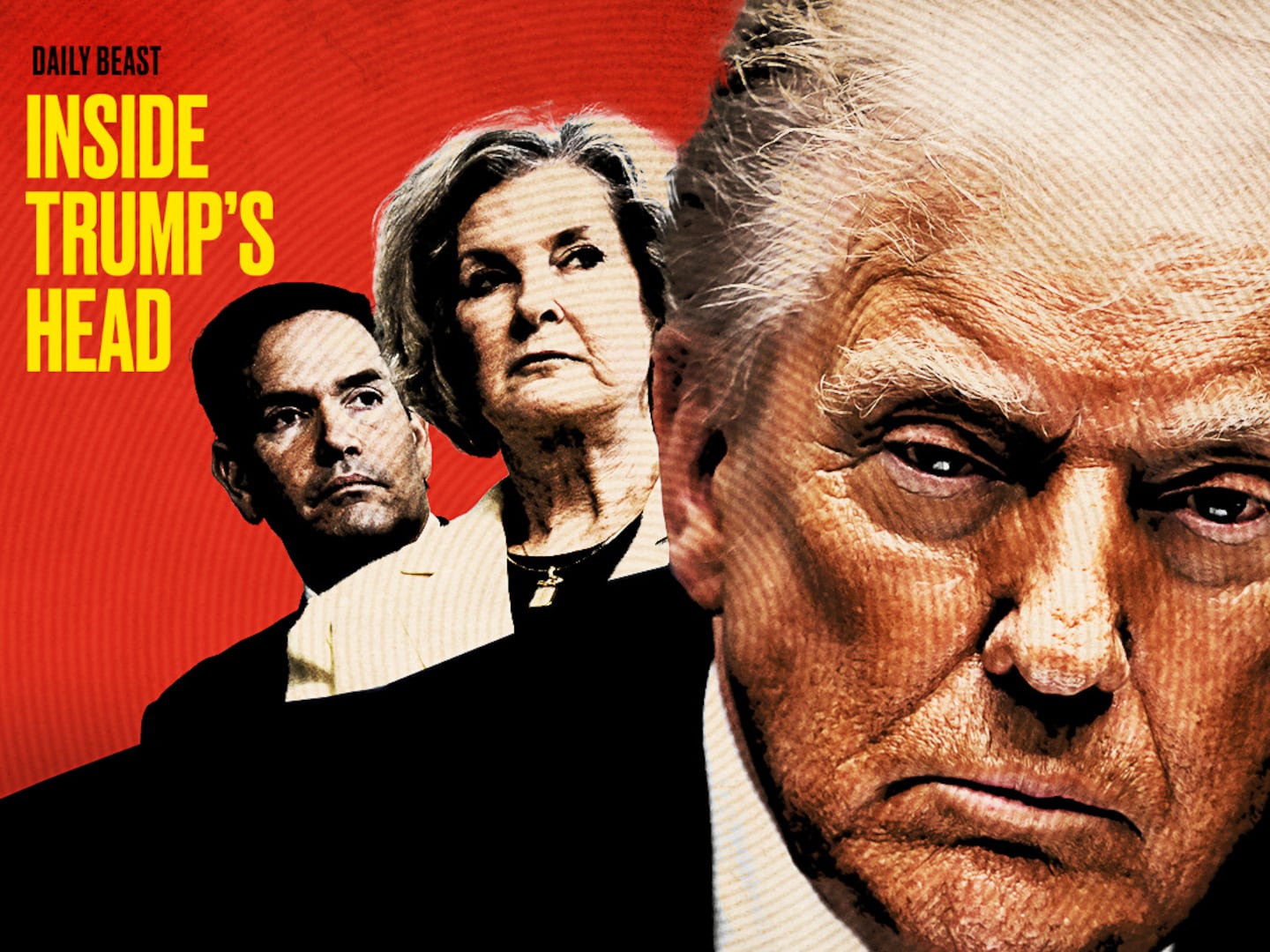Game of Thrones’ fifth season is barreling past George R.R. Martin’s last books at light speed now, every episode snowballing in narrative momentum. “Sons of the Harpy,” the fourth episode of the season, reduced kings and Lord Commanders to putty in the hands of women. It ominously foreshadowed future dangers: the Greyscale disease! The Sand Snakes’ revenge! The Lannisters’ twincest secret, about to spill into the open! And it hinted at a tantalizingly plausible answer to one of this series’ most nagging questions: Who is Jon Snow’s mother?
It also dealt us our first (probable) loss of the season: Ser Barristan Selmy, who’s not looking so hot after fighting the rebel insurgents of Meereen, the Sons of the Harpy. Wearing noblemen’s garb and gold masks—the Harpies are largely believed to be working for the Masters of Slaver’s Bay, who want their pre-Daenerys Targaryen slave-based economy and way of life back—the rebels corner Grey Worm and his Unsullied soldiers, then close in. Caught in close quarters (bad news for spear-wielders) and outnumbered with only seven or eight men (who’ve been trained to fight in mass formation), the Unsullied begin to fall.
Then the music swells and Selmy swoops in, sword swinging. It’s gallant, it’s rousing—it’s two minutes before he gets stabbed in the back. And then the chest. He also gets kicked a few times and slashed across his legs. We’re calling him “dead” right now in the same way we assume the Hound is dead, though no one is really 100 percent sure. But unless ye olde Westerosi Re-Animator Thoros of Myr makes a surprise cameo in next week’s episode, this really seems like the end for Barristan the Bold.
Grey Worm suffers a knife wound under his arm and passes out next to Selmy but, uh, he can survive that, right? He didn’t get any last, tender moments with Missandei or Daenerys, or a rousing final-episode speech to endear him to viewers right before he’s taken away. (Please be alive, Grey Worm!) But Selmy did. The ex-Kingsguard Selmy told a heartwarming story about getting drunk with a Targaryen prince in the streets of King’s Landing, humanizing Daenerys’s brother in a way we hadn’t seen before. It was sweet, sure, but it could have also served a dual purpose. One that has to do with Jon Snow’s parentage.
Tin foil hat warning! The next two paragraphs contain potentially spoilery fan theories.
By now, you’ve probably heard of “R+L=J,” the theory that Rhaegar Targaryen (Dany’s older brother) and Lyanna Stark (Ned’s younger sister) are Jon Snow’s real parents. History says Rhaegar kidnapped and raped Lyanna, who was then betrothed to Robert Baratheon. This kidnapping set off the chain of events that led to Robert’s Rebellion, the war that ended with the death of the Mad King and the near-extinction of the entire Targaryen line. Supposedly, Ned Stark returned from the war to Winterfell with a newborn son, borne by “some tavern slut,” as Lady Selyse puts it in this episode. Stannis, however, doesn’t buy it. That “wasn’t Ned Stark’s way,” he says.
If Barristan Selmy is to be believed, kidnapping and raping an innocent woman wasn’t Rhaegar’s way either. He makes the late prince sound like a cool, normal guy who “never liked killing” and “loved singing.” Littlefinger divulges a bit of Rhaegar history in this episode as well, telling Sansa about a joust between Rhaegar and Barristan that ended with the lovestruck Targaryen laying a wreath of winter roses in Lyanna’s lap, shocking everyone who watched. (Rhaegar was married to Elia Martell, Oberyn’s sister, at the time.) Noticeably, Littlefinger omits Lyanna’s reaction from his story. Was she shocked, too? Embarrassed? Or did she smile? Did Lyanna love Rhaegar back? The prevalent theory is that Lyanna bore Rhaegar’s child and made Ned promise to take the boy and keep him a secret—especially from Robert, who was dead-set on killing anyone with Targaryen blood.
Whatever the answer is, there’s clearly something special in the bastard's blood, or Melisandre wouldn’t keep trying to bone him.
Back in King’s Landing, Cersei exacts revenge against Margaery for throwing shade and turning Tommen against her in the most batshit, short-sighted way possible; a Cersei signature move. She gives the High Sparrow—now the High Septon, head of the Faith of the Seven—permission to re-establish the Faith Militant, the military arm of Westeros’s dominant religion. Let that sink in: A bunch of Puritan-level religious conservatives just got permission to become a militant force.
Immediately, the Sparrows begin bludgeoning their way through King’s Landing, destroying barrels of wine and anything that might be used for gambling, including chess. (Chess!) Lancel Lannister, Cersei’s cousin and ex-boytoy, carves a Seven-Pointed Star into his forehead so we all see how hardcore he is, or something. But the real fear comes in Littlefinger’s brothel, as the Sparrows tear through every room until they find one containing two men. They snarl gay slurs, then one Sparrow pulls out a knife, promising to make the lovers “pay.” Olyvar recoils in horror, aware of exactly what this means.
Sure enough, his lover Loras Tyrell is immediately arrested and thrown into the dungeons, thanks to Cersei’s snitching. Tommen flaps about the capital, ineptly trying to free his brother-in-law, before Margaery sends for the only person she knows can get the job done: Lady Olenna Tyrell, the baddest bitch in the Seven Kingdoms.
Meanwhile, Cersei keeps smirking like she’s done something terribly clever. What does she think the Sparrows would do to her if they knew about her own bazillions of unholy indiscretions?
It helps to understand who the hell these guys are. The Sparrows are a new religious movement within the Faith of the Seven, the most common religion throughout Westeros. You often hear characters talking about the “New Gods” and the old; the Seven refers to the new religion. Many Northerners, including wildlings and the Starks, still worship the Old Gods, countless spirits inhabiting nature. “Worship” for them is often defined by meditation in godswoods, which contain the spiritual weirwood trees with faces carved into them, called heart trees.
In contrast, those who ascribe to the Faith of the Seven believe in only one god, the God of the Seven. This god earned its name because of its seven “faces”: the Father, the Mother, the Maiden, the Crone, the Warrior, the Smith, and the Stranger. Septs throughout Westeros are dedicated to worship of the Seven. But as we hear Cersei mention in this episode, many of those septs have been destroyed in the wake of the War of the Five Kings. She mentions rapes of Silent Sisters—women dedicated to serving the “face” of the Seven that represents death, the Stranger—and bodies of holy men “piled in the streets.” This is where the Sparrows come in.
Really, the Sparrows are just the poorest or lowest-ranking members of the Faith, who banded together in response to the noblemen’s war’s devastating effect on the common folk. (They chose the name “Sparrow,” in fact, because they are one of the most common birds in the world.)
Now that the Faith Militant has been resurrected, the Sparrows are likely to take on one of its two traditional orders: the “Stars” or Poor Fellows, who act as military footmen, or the “Swords” or Warrior’s Sons, reformed noblemen like Lancel who’ve renounced their riches to fight for the Seven. Like, say, Catholicism, there are a lot of rules associated with the Seven (no homosexuality, for one) that come from a Bible-like holy book called The Seven-Pointed Star. This text is likely guiding the Sparrows’ harsh crackdown on King’s Landing.
But what do we know about the High Sparrow? Nothing, it turns out; we don’t even know the guy’s name. Cersei has conferred a huge amount of power onto a man she barely knows, assuming he’ll remain loyal because…he doesn’t wear shoes? Because he owes her his power? Cersei asks the High Sparrow a question while she’s ratting out Loras: “What would you say if I told you of a great sinner in our very midst? Shielded by gold and privilege?” She goes on smirking, as if she hadn’t just described herself as accurately as Loras. It’s a dangerous gamble: if the High Sparrow catches on to Cersei’s game, he will make her pay dearly.






